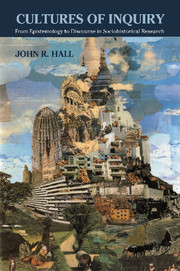Book contents
- Frontmatter
- Contents
- List of tables and figures
- Acknowledgments
- Prologue
- 1 Introduction: the Third Path
- PART I FORMATIVE DISCOURSES
- PART II PRACTICES OF INQUIRY
- 6 Discursive hybrids of practice: an introductory schema
- 7 Generalizing practices of inquiry
- 8 Particularizing practices of inquiry
- 9 The prospects for inquiry
- Notes
- Bibliography
- Index
6 - Discursive hybrids of practice: an introductory schema
Published online by Cambridge University Press: 22 September 2009
- Frontmatter
- Contents
- List of tables and figures
- Acknowledgments
- Prologue
- 1 Introduction: the Third Path
- PART I FORMATIVE DISCOURSES
- PART II PRACTICES OF INQUIRY
- 6 Discursive hybrids of practice: an introductory schema
- 7 Generalizing practices of inquiry
- 8 Particularizing practices of inquiry
- 9 The prospects for inquiry
- Notes
- Bibliography
- Index
Summary
In recent years, the gap between objectivism and relativism has been remapped onto a divide between modern and postmodern sensibilities. Among strong postmodernists, the collapse of objectivity and science is taken as beyond serious debate, and inquiry is judged by humanistic and pragmatic standards of aesthetics, poetics, morals, and interpretive insight, rather than by objective standards of truth. But postmodernists can end up asserting a rejection of modernist inquiry that is paradoxically essentialist. Against this tendency, modernists recognize relativity, but work to salvage reason in the face of it. These tensions are not easily negotiated. However, the controversy shows how problematic both modernist and postmodernist positions can be, and this is a potentially fruitful result. Once the supposedly sharp lines between historical and fictional narratives, between science and interpretation, between text and world are drawn into question, it is possible to ask whether humanistic, historical, and social scientific inquiry – modern or postmodern – are really so distant from one another. Perhaps, instead, the inquiries conventionally allocated to history or science, modern or postmodern, depend upon an interconnected set of practices that transcend presentday disciplinary and interdisciplinary boundaries of the humanities, history, and the social sciences.
To anticipate such a possibility, the present chapter introduces a schema for examining how culturally meaningful practices of inquiry (such as “historicism” or “analytic generalization”) become consolidated through mutual articulations among value discourse, narrative, social theory, and explanation and interpretation as formative discourses.
- Type
- Chapter
- Information
- Cultures of InquiryFrom Epistemology to Discourse in Sociohistorical Research, pp. 169 - 179Publisher: Cambridge University PressPrint publication year: 1999



